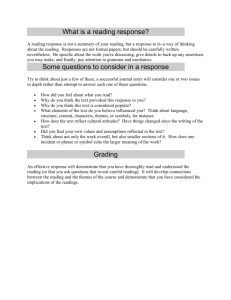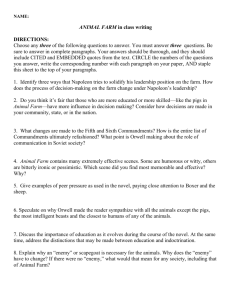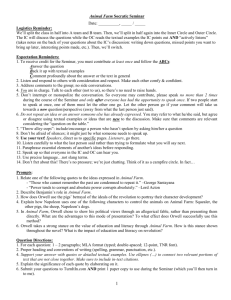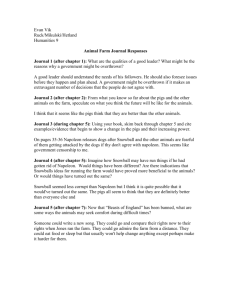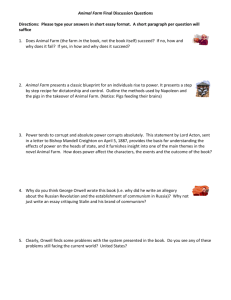Animal farm * chapters 8-10
advertisement
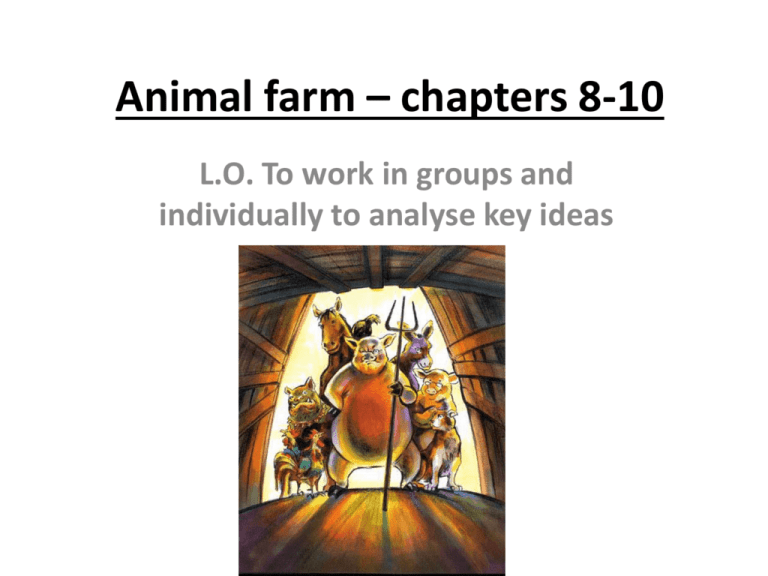
Animal farm – chapters 8-10 L.O. To work in groups and individually to analyse key ideas Big picture • • • • • • Card sort Links with Russian revolution Quick test on homelearning Group work Presentations PEAS Outcomes A-A* - make detailed and perceptive comments on language, themes and context when discussing and writing a PEAS paragraph B- make clear and relevant comments on language and themes when discussing and writing a PEAS paragraph C – make some comments on language and themes when discussing and writing a PEAS paragraph. Connector • Complete the character comparison card sort in pairs • Glue correct version in your books Links to Russian revolution • Re-read worksheet on Russian history. Complete the table Homelearning • 1. 2. 3. 4. 5. 6. How much do you remember from your reading? Quick test 1-10 What has the commandment about killing another animal been changed to? Who does Napoleon use as his public spokesperson and why? How has Napoleon extended his power over the other animals on the farm? What is Fredrick’s role within this story? How does he trick Napoleon? How do the other animals feel after the Battle of the Windmill? How do the pigs celebrate their victory? What further commandment do they change? 7. How is the myth of Snowball’s treachery perpetuated in the novel? 8. Which animal character remains largely unchanged? How would you describe him? 9. What sight witnessed by Clover and the other animals terrify them in the final chapter? 10. What is the most important commandment and how had this been changed? TASK: Group work on key extract • In groups of 3 you will be given an extract from chapters 8-10. You should discuss and make notes on the language and Things you should look out for: themes. Instructions: 1. Read the passage first 2. In your groups discuss what is happening in the passage. 3. Next, highlight key lines, words or phrases 4. Next, on a piece of sugar paper, make detailed analytical notes ... SATIRE: is Orwell making fun of any characters in particular? ALLEGORY: is Orwell making a link to any real people in history? SYMBOLISM: does the character/ situation/ event represent something else? IRONY: are any of the things characters say or do which is the opposite of what is expected or what will happen? POWER/GREED/CORRUPTION/FEAR/ IGNORANCE/ HOPELESSNESS: is there anything said or done that reveals these themes? Any other themes you can spot? PROPAGANDA: are the pigs trying to brainwash the animals in some way? Presentations • In your groups, present your findings to the class. TASK: write a PEAS paragraph • POINT. EVIDENCE. ANALYSIS. SPECULATION. Answer this question in as much detail as you can using PEAS. How do things change from bad to worse on Animal Farm? Example POINT. EVIDENCE. ANALYSIS. SPECULATION. • How do things change from bad to worse on Animal Farm? Things change from bad to worse on Animal Farm since the pigs are manipulating the animals for their own gains. Under the leadership of Napoleon, “once again all rations were reduced, except those of the B pigs and the dogs”. The words “once again” suggests that this is a grade recurring event and that it is getting worse. Furthermore, the food that is taken away seems to be going to the pigs and dogs. This supports the point that the animals are being divided and a hierarchy is being established. When Squealer, Napoleon’s front pig, explains that “A too rigid equality in rations...would have been contrary to the A principles of Animalism” Orwell is using irony since Animalism is all grade about equality and the pigs are creating an unequal society. Moreover, Orwell’s story is an allegory about Russian communism and so he is revealing how greed for power and the use of propaganda had corrupted Marx’s ideas. The speculation forms the A-A* part of your answer since it offer detailed and perceptive comments on the bigger picture, in this case the background context Homelearning How do things change from bad to worse on Animal Farm? Complete this answer – we will assess this at the beginning of next lesson. Mock exam paper practice next lesson! Review • Read out your answers so far to the person next to you. • Which outcome have you met? Which outcome to do want to meet? A-A* - make detailed and perceptive comments on language, themes and context when discussing and writing a PEAS paragraph B- make clear and relevant comments on language and themes when discussing and writing a PEAS paragraph C – make some comments on language and themes when discussing and writing a PEAS paragraph.
